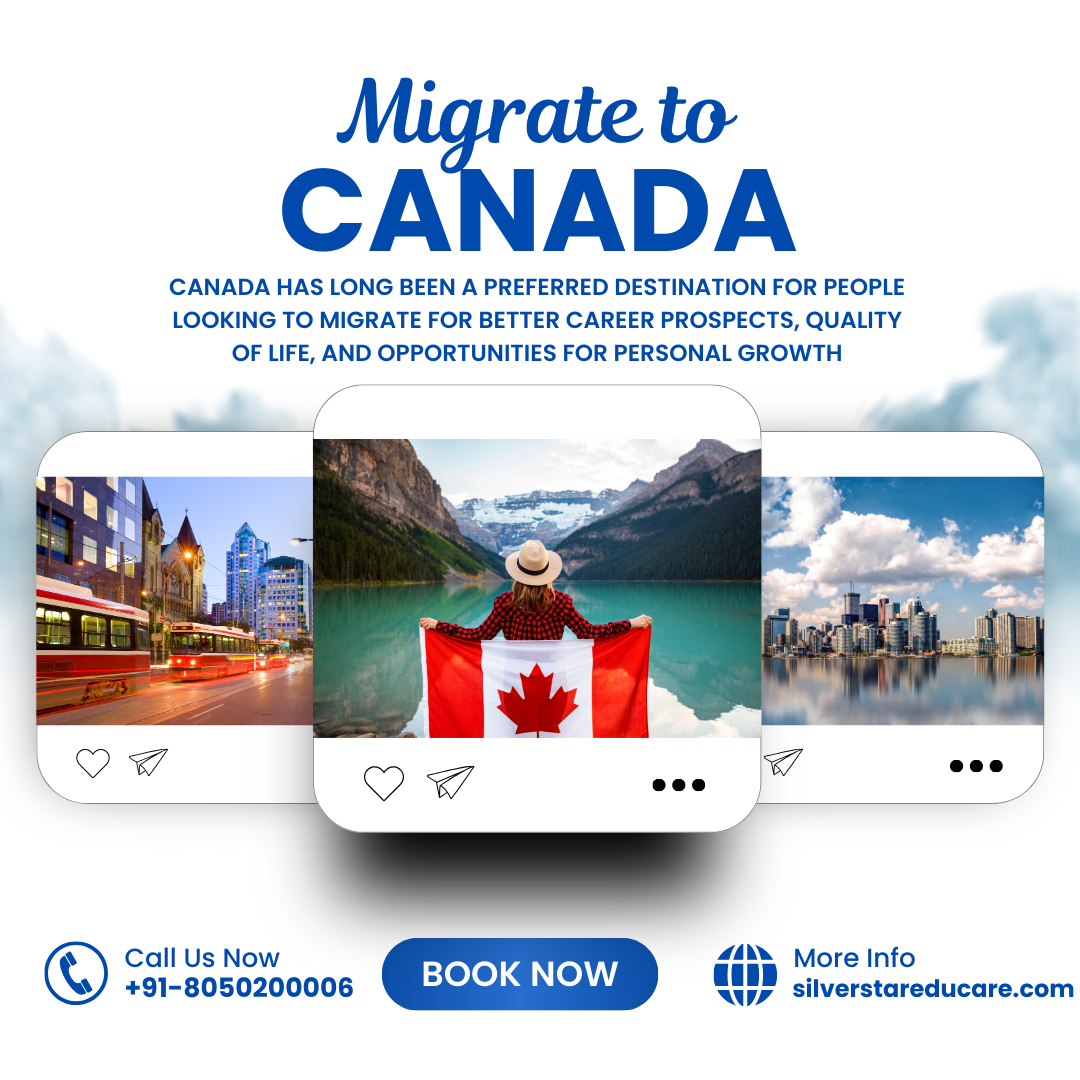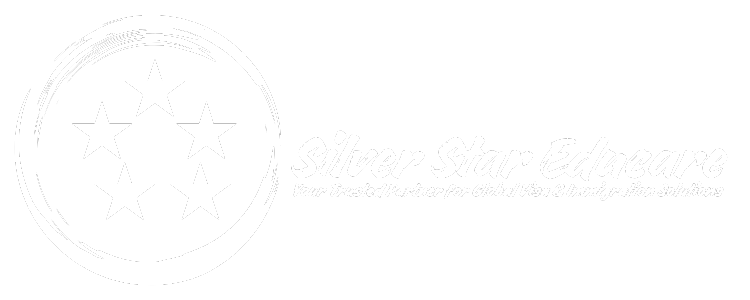- PLOT NO. 11/12, Second Floor, Sector 25, Chandigarh.
- contact@silverstareducare.com
- +91-8050200006
- Mon - Sat : 09:00 AM - 18:00 PM
A Comprehensive Guide for Indians Migrating to Canada: Formalities and Options
Related Post
Personality Development: Unlocking Your True Potential
The DHA Exam
22/04/2025
Master the NCLEX Exam with Silver Star Educare
22/04/2025

Any Questions? Call us
+91-80502-00006
Any Questions? Email us
contact@silverstareducare.com

Canada has long been a preferred destination for people looking to migrate for better career prospects, quality of life, and opportunities for personal growth. Known for its welcoming immigration policies, diverse culture, and high standard of living, Canada has become one of the top choices for Indians seeking a better future. Whether you’re looking to move permanently or temporarily, Canada offers a variety of immigration pathways suited to different skill sets, personal circumstances, and goals.
In this blog, we’ll explore the formalities, eligibility requirements, and various migration options for individuals from India who wish to make Canada their home.
Why Canada?
Before diving into the formalities and options, let’s first understand why Canada is such an attractive destination for Indian migrants. Some of the key reasons include:
-
High Quality of Life: Canada ranks consistently high in global indices for health care, education, safety, and overall living standards.
-
Multicultural Environment: Canada is one of the most multicultural nations in the world. It has a rich diversity, and Indian communities are well-established in many Canadian cities.
-
Strong Economy: Canada offers excellent job opportunities, especially in sectors like IT, healthcare, engineering, and skilled trades. The Canadian economy is strong and has a high demand for skilled labor.
-
Immigration-Friendly Policies: The Canadian government offers numerous immigration pathways, allowing individuals from all over the world, including India, to apply for permanent residency and citizenship.
Now, let’s get into the specifics of migrating to Canada from India.
1. Express Entry Program
One of the most popular pathways for skilled professionals to immigrate to Canada is through the Express Entry system. It is an online system used by the Canadian government to manage applications for permanent residence from skilled workers.
Eligibility Criteria for Express Entry:
-
Language Proficiency: Applicants need to prove their proficiency in English or French by taking standardized language tests such as IELTS for English or TEF for French. A high score will increase your chances of being selected.
-
Education: A minimum of a high school diploma is required, but higher education, such as a degree or diploma, can significantly boost your application. Educational credentials need to be assessed by a designated organization (WES – World Education Services, for example) to be recognized in Canada.
-
Work Experience: Skilled work experience in a specific occupation that is listed under Canada’s National Occupational Classification (NOC) system is required. Most candidates need at least one year of full-time work experience.
-
Age: Age can affect the number of points you receive under the Express Entry Comprehensive Ranking System (CRS). Applicants between the ages of 18 and 35 earn the most points.
-
Financial Proof: Applicants must show they have enough funds to support themselves and their families when they arrive in Canada, unless they have a valid job offer.
How the Express Entry System Works:
The Express Entry process begins with the applicant submitting an online profile to the pool of candidates. Candidates are ranked based on the CRS, which takes into account factors like age, education, work experience, language proficiency, and whether the applicant has a job offer in Canada. Every few weeks, Canada’s immigration authorities invite the highest-ranking candidates to apply for permanent residency.
2. Provincial Nominee Program (PNP)
If you have a specific province in Canada in mind, you may want to explore the Provincial Nominee Program (PNP). Each Canadian province and territory operates its own immigration program that nominates individuals who wish to settle in a particular area of the country.
Eligibility for PNP:
-
Job Offer: Most provincial programs require applicants to have a job offer from an employer in that province.
-
Work Experience and Skills: Different provinces have varying requirements for work experience and skills. Some provinces may focus on specific industries or occupations.
-
Intent to Settle: Applicants must show that they intend to live and work in the province that has nominated them.
For Indians, PNPs offer an excellent opportunity to move to Canada, especially for people who may not score high enough on the Express Entry CRS. If nominated by a province, applicants receive an additional 600 points toward their Express Entry profile, significantly increasing their chances of being invited to apply for permanent residency.
3. Family Sponsorship Program
Canada recognizes the importance of family reunification. The Family Sponsorship Program allows Canadian citizens and permanent residents to sponsor their spouses, children, parents, and other eligible relatives for permanent residency.
Eligibility for Family Sponsorship:
-
Sponsor’s Status: The sponsor must be a Canadian citizen or permanent resident.
-
Relationship Proof: You must provide proof of your relationship with the person being sponsored, such as marriage certificates, birth certificates, or adoption papers.
-
Financial Support: The sponsor must demonstrate that they have the financial ability to support the relative being sponsored.
This is a popular option for individuals who already have family members living in Canada and want to reunite with them.
4. Student Visa (Study Permit)
For those who wish to pursue education in Canada, applying for a study permit is one of the most common and effective ways to migrate. Canada is home to several world-class universities and educational institutions, and students from India flock to Canada for their studies.
Eligibility for Student Visa:
-
Letter of Acceptance: You must be accepted by a Designated Learning Institution (DLI) in Canada.
-
Financial Proof: You must show that you can support yourself and any accompanying family members during your stay in Canada. This includes tuition fees, living expenses, and return transportation costs.
-
Language Proficiency: Proof of proficiency in English or French, such as IELTS or TOEFL, is generally required.
-
Intention to Leave Canada: You must prove that you will leave Canada at the end of your studies.
While studying in Canada, international students can work part-time, and after graduation, they may be eligible for a Post-Graduation Work Permit (PGWP). This work permit can be a stepping stone toward permanent residency through the Canadian Experience Class under Express Entry.
5. Visitor Visa
For those who want to visit Canada temporarily, a visitor visa is an option. A visitor visa is typically used for tourism or visiting family and friends. However, it is important to note that a visitor visa does not grant permanent residency or the right to work in Canada.
If you’re planning to visit Canada and later apply for permanent residency, the visitor visa can be the first step. You would need to apply for permanent residency once you are in the country.
6. Start-Up Visa Program
Canada is also a destination for entrepreneurs looking to start a business. The Start-Up Visa Program allows immigrant entrepreneurs to establish their businesses in Canada if they can meet the program’s requirements.
Eligibility for the Start-Up Visa:
-
Innovative Business Idea: You need to have an innovative business idea that has the potential to create jobs for Canadians.
-
Support from a Designated Organization: Your business must be supported by a designated Canadian venture capital fund, angel investor group, or business incubator.
-
Language Proficiency: You must meet language requirements in either English or French.
This is an excellent option for individuals who are entrepreneurs or have a business idea that could succeed in Canada’s vibrant economy.
Conclusion
Canada’s immigration system offers multiple pathways for individuals from India to build a future in one of the world’s most welcoming countries. Whether you’re an entrepreneur, skilled professional, student, or family member, there is an immigration option for you. The key to success lies in understanding the eligibility requirements, gathering the necessary documents, and following the proper channels.
Starting your immigration journey can seem overwhelming, but with proper planning and professional guidance, you can navigate the process effectively. Canada is known for its high quality of life, excellent work opportunities, and inclusive society, making it an ideal destination for those seeking a fresh start. Good luck with your migration journey!
